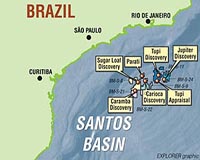 |
New Orleans, Louisiana (AFP) July 14, 2010 BP received the green light Wednesday from the US government and began a crucial test that could allow the leaking Gulf of Mexico oil well to be sealed once and for all. After days of painstaking deliberations, Admiral Thad Allen announced he had given the British energy giant the go-ahead after overcoming fears the test could lead to "irreversible leakage" below the seabed. "At this time we will be releasing an order to BP to proceed with the well integrity test," said Allen, the former US Coast Guard chief leading the government's response to the 85-day disaster. "This test will run for a maximum of 48 hours at which time we will stand down, assess where we're at, and assess the next steps." The test involves shutting off the valves on a 75-tonne cap installed on Monday to evaluate the integrity of the well bore, which stretches down 2.5 miles (four kilometers) below the seabed. High pressure readings would allow the three valves to remain shut and the well would effectively be sealed, but low ones could mean there is a hole somewhere in the casing of the well where oil is escaping. "It will be terrific news if we can shut in the well but I don't think we can say that," Allen said. "I don't want to get anybody's hopes up that we can shut this well in until we get the empirical readings we need." Allen on Tuesday delayed the high-stakes procedure for 24 hours for further analysis to be conducted, and only made the decision to proceed after meetings with top oil industry experts and US officials, including Energy Secretary Steven Chu, a Nobel Prize-winning physicist. The White House said President Barack Obama was being kept up-to-date at this pivotal time, and sought to reassure the US public that the administration was putting safety first. "Based on new information and analysis, Secretary Chu and other scientists concluded that the test should now proceed with several modifications and safety requirements," the White House statement said. "The directive will require additional seismic testing and monitoring from ROV's (Remotely Operated Vehicles) as well as acoustic and temperature monitoring throughout the duration of the well integrity test." After months of environmental and economic ruin, the final deliberations were a further agonizing delay for anxious Gulf residents whose livelihoods depend on the oil being stopped and the huge surface mess being cleared up. Once the valves on the cap are closed, no oil will be streaming into the Gulf for the first time since the Deepwater Horizon rig sank 83 days ago. The process will be done gradually in six-hour intervals as a massive pressure shift could send oil shooting up through a new leak on the sea floor, further aggravating the worst oil spill in US history. "If the pressure readings stay low, that will tell us that the oil is probably going some place else and we need to consider the fact we may have a breach in the well bore or in one of the casings," Allen said. "If that is the case and we have very low pressure readings for about three hours we will probably stop at that point." Although containment operations would have to then resume, officials say the new cap gives them the ability to capture all the leaking oil in a matter of days. Drilling on a relief well that is now only four feet (1.2 meters) away from the leaking well will be suspended when the integrity test starts. Even if the well is found to be secure and the cap is left on, the relief well will be drilled to completion so the oil reservoir can be permanently plugged with cement in a "kill" operation expected in mid-August. Gulf residents have seen an estimated 35,000 to 60,000 barrels of oil spewing from the well daily since an explosion destroyed the BP-leased drilling platform 50 miles (80 kilometers) off the coast of Louisiana in April. An estimated two million to four million barrels of crude have gushed into the sea since the Deepwater Horizon sank on April 22, two days after the blast which killed 11 workers. Tar balls and ribbons of crude have washed up along all five Gulf states, from Texas to Florida, shutting down key fishing grounds and scaring away tourists key to local economic health. The Gulf disaster has cost BP some 3.5 billion dollars (2.78 billion euros) and compensation could mean it ends up forking out 10 times that figure.
Share This Article With Planet Earth
Related Links Powering The World in the 21st Century at Energy-Daily.com
 More oil added to Brazil's reserves
More oil added to Brazil's reservesRio De Janeiro (UPI) Jul 13, 2010 First tests at Brazil's offshore Franco field added another 50,000 barrels a day of crude oil to the Latin American country's reserves amid a mixture of celebration and caution in the aftermath of the Gulf of Mexico environmental disaster. Brazil, like Canada and other countries with major newly discovered hydrocarbon reserves, has reacted to BP's Deepwater Horizon woes with measures de ... read more |
|
| The content herein, unless otherwise known to be public domain, are Copyright 1995-2010 - SpaceDaily. AFP and UPI Wire Stories are copyright Agence France-Presse and United Press International. ESA Portal Reports are copyright European Space Agency. All NASA sourced material is public domain. Additional copyrights may apply in whole or part to other bona fide parties. Advertising does not imply endorsement,agreement or approval of any opinions, statements or information provided by SpaceDaily on any Web page published or hosted by SpaceDaily. Privacy Statement |